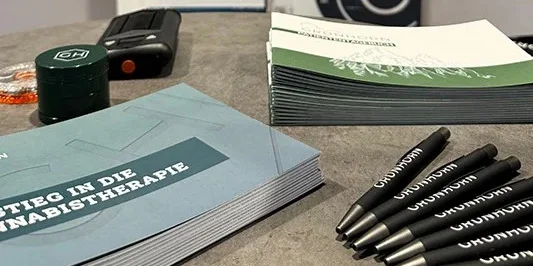It may sound paradoxical, as cannabis is often only perceived as a "drug" by the public and not enough as a therapeutic agent. However, its use in addiction therapy is an emerging field of research, based on interactions with the human endocannabinoid system.
Grünhorn, as Germany's largest cannabis group, advocates for addiction therapy with medicinal cannabis. As part of this commitment, Grünhorn participated in the 24th Congress of the German Society for Addiction Medicine (DGS). The interdisciplinary exchange took place in Munich from July 4 to 6, 2024. The DGS is the largest medical society for addiction medicine and is committed to destigmatizing medicinal cannabis.
Stefan Fritsch, founder of the Grünhorn Group: "We are proud to be part of this strong network. Medicinal cannabis is finally being used as an alternative to painkillers like opioids, which pose a real challenge for addiction patients. Addiction to painkillers can quickly occur in cases where opioids are used to treat pain, such as in injuries. Therefore, cannabis should once again be recognized as a low-side-effect pain reliever with much lower addiction potential, as it was commonly found in German medicine cabinets before it was banned in the 1930s."
Grünhorn Symposium
This year, Grünhorn actively participated with a 90-minute symposium at the interdisciplinary forum for addiction therapy, addiction-related diseases, and acute care of addicts to discuss the latest findings and developments in addiction medicine and exchange experiences with the attending experts. Under the title "Medical Cannabis – An Option for Addiction Medicine? " current developments in research and innovative treatment approaches, such as the potential of medical cannabis to treat opioid addiction, were discussed. The focus was on interdisciplinary exchange between psychotherapists, physicians, and scientists. The potential of terpenes for personalized therapy with cannabis plants was also a topic. Speakers at the Grünhorn Symposium included Dr. Manfred Nowak (specialist in psychiatry and psychotherapy, Landau), Prof. Kirsten Müller-Vahl (specialist in psychiatry and neurology, Hanover), and the head of the Grünhorn Academy, Dr. Nadine Herwig (biochemist, Leipzig).
How Cannabis Can Support Addiction Medicine
- Addiction disorders are characterized by a dysfunctional reward system in the brain, altered by repeated use of addictive substances such as alcohol, opioids, nicotine, or cocaine.
- The endocannabinoid system plays an important role in regulating physiological processes such as mood, appetite, pain perception, and reward behavior.
- Cannabis contains cannabinoids like tetrahydrocannabinol (THC) and cannabidiol (CBD).
- Studies show that CBD has neuroprotective properties and can help reduce addictive behaviors by alleviating anxiety and stress, which are common triggers for relapse.
- THC can be used as a substitute for harder drugs. In controlled amounts, it can ease withdrawal symptoms.
- Additionally, THC can stabilize mood by activating the endocannabinoid system, thus preventing relapses due to mental lows.
- Studies show that patients who use cannabis as a substitute medication have lower usage of opioids, alcohol, and nicotine, resulting in an improved quality of life.

